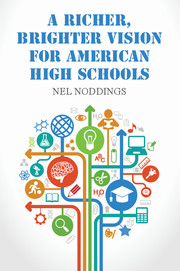Book contents
- Frontmatter
- Contents
- Introduction
- 1 Unity of Purpose
- 2 Vocational Programs
- 3 What Might Have Been: Women's Traditional Interests
- 4 A Better Adult: Continuing the Search
- 5 Parenting
- 6 The Common Core Standards
- 7 Critical Thinking
- 8 Collegiality, Caring, and Continuity
- 9 The Curriculum and Its Setting
- 10 Planning, Enacting, Evaluating
- 11 The Professional Preparation of Teachers
- 12 Reflecting on the Brighter Vision
- Notes
- Bibliography
- Index
8 - Collegiality, Caring, and Continuity
Published online by Cambridge University Press: 05 June 2015
- Frontmatter
- Contents
- Introduction
- 1 Unity of Purpose
- 2 Vocational Programs
- 3 What Might Have Been: Women's Traditional Interests
- 4 A Better Adult: Continuing the Search
- 5 Parenting
- 6 The Common Core Standards
- 7 Critical Thinking
- 8 Collegiality, Caring, and Continuity
- 9 The Curriculum and Its Setting
- 10 Planning, Enacting, Evaluating
- 11 The Professional Preparation of Teachers
- 12 Reflecting on the Brighter Vision
- Notes
- Bibliography
- Index
Summary
In addition to an emphasis on critical thinking, the Common Core advocates attention to such “soft skills” as collegiality, cooperation, communication, teamwork, and social skills. This chapter will discuss how we might promote these skills for both students and teachers. I will start with collegiality, then discuss the need to establish relations of care and trust in order to support the whole array of social skills, and conclude with an argument in support of continuity of subject matter, people, and place in our high schools.
COLLEGIALITY
“Collegiality” conveys the notion of shared responsibility. In Chapter 1, I commented on the collegial organization used at Columbia University in planning and implementing its freshman core course. Its benefits, described by Andrew Delbanco, include the mixing of students from various departments, socio-economic backgrounds, and social clubs.
The Core also counters the provincialism of the faculty. Senior and junior professors, along with graduate student instructors, gather weekly to discuss the assigned texts – a rare opportunity for faculty from different fields, and at different stages of their careers, to consider substantive questions. And, not least among its benefits, it links all students in the college to one another through a body of common knowledge; once they have gone through the core, no student is a complete stranger to any other.
I am not sure the claim that “no student is a complete stranger to any other” can be sustained, but the random assignment of students to small core classes is certainly valuable in extending both friendships and information on various programs at the university. I have already suggested that such a mixture of students be used in the four-year social studies classes designed to treat collegially planned interdisciplinary themes. High school English teachers might also adopt this process and use random assignment of students to small discussion groups as they promote the interdisciplinary knowledge required for contextual understanding of the documents students are now expected to analyze. The idea of collegiality – shared responsibility – is valuable for students as well as teachers.
- Type
- Chapter
- Information
- A Richer, Brighter Vision for American High Schools , pp. 115 - 128Publisher: Cambridge University PressPrint publication year: 2015



